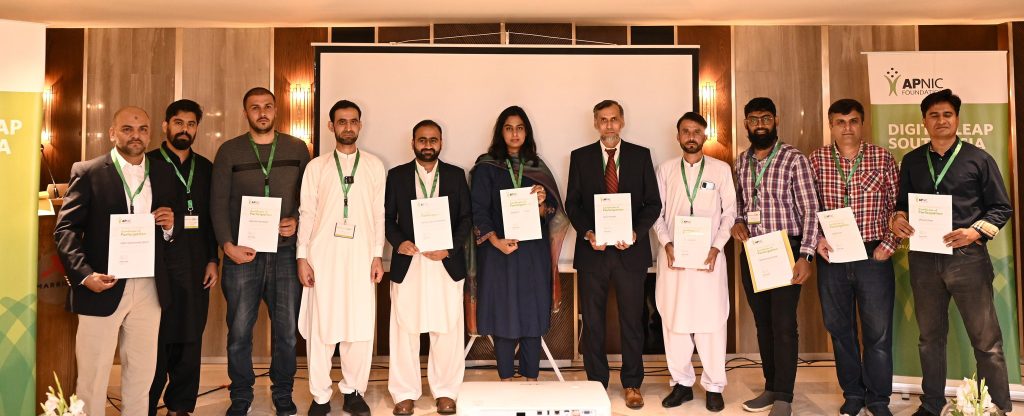Foundation Projects
Digital Leap South Asia
APNIC Foundation
South Asia is characterized by a diverse Internet landscape, with each economy playing a role in the larger digital evolution of the sub-region. According to the ITU’s 2022 World Telecommunication/ICT Indicators Database, there are five South Asian economies where over 50% of the population is offline – Afghanistan, Pakistan, Bangladesh, Sri Lanka and India.
The offline population in South Asia accounts for a total of over 1.49b. This is over 57% of the total 2.6b unconnected people of the world (ITU). This remarkable statistic positions South Asia as home to the largest offline population, globally.
There are multiple factors causing these challenges, including skill shortages, investment barriers, unclear regulations, infrastructure deficiencies, and inadequate regional collaboration. Insufficient skilled professionals, coupled with a lack of training opportunities, slow down development. Meanwhile, delays in infrastructure expansion and market competition are caused by inadequate investment and regulatory challenges. Complex policy and the regulatory environment further worsen these issues. Geographical challenges also result in poor-quality Internet services. Moreover, limited regional cooperation restricts collaborative solutions.
APNIC Foundation’s Response to the problem:
The Foundation, following a community consultation in Afghanistan in 2022, launched a skills development project starting from Afghanistan which trained 30 (about 30% women) Internet professionals in new Internet topics with a diverse array of online training and certification programs and resources. Additionally, the Afghanistan Project actively supported a number of community-led initiatives, including Afghanistan School on Internet Governance (AFSIG), Afghanistan Network Operators Group (AFNOG), the national Afghanistan Internet Governance Forum (IGF); and Afghanistan Youth IGF (AyIGF).
Building on the success of the Afghanistan Project, the APNIC Foundation is broadening the project’s scope to include the wider South Asian region under the new ‘Digital Leap South Asia’ initiative. The project covers three economies, adding the Maldives and Pakistan.
Project Goal and Objectives
The goal of the project is to help enhance technical skills and competencies in Internet development, operations, security, and policy and regulatory in three South Asian economies of Afghanistan, Pakistan, and Maldives.
The project objectives are to:
- Increase awareness and encourage best practices in Internet governance.
- Develop technical knowledge and skills.
- Enhance regional collaboration and engagement, particularly in areas of policy/regulations and infrastructure.
2024 update:
- Participants: 60 enrolled (30% women): Afghanistan (24), Maldives (10), Pakistan (26).
- Professional Development: 492 courses and professional certifications approved activities, 83% completion rate (as of Jan 30). Among them were 324 trainings completed, and 83 professional certifications awarded. An additional 72 professional certifications are in progress and expected to be completed by the end of March 2025.
- Satisfaction and Impact: In response to the end of the year participant survey, 97.83% of the participants reported satisfaction with the project’s skill development track with 87.50% reporting the professional development activities were strongly empowering. 90.38% respondents indicated they have greater confidence and 9.62% somehow greater confidence in their technical skills and capabilities because of the technical skills they gained. In addition, 67.31% said they received promotions, salary increase or career advancements.
- Awareness Sessions: Over 700 regional participants came together in various supported programs. There was representation at the 2024 Internet Governance Forum (IGF) and Asia Pacific Regional Internet Governance Forum (APrIGF), with multiple session proposals accepted and successfully delivered engaging about 200 onsite attendees, 40 speakers and moderators, and 19 sponsored DLSA participants and Internet leaders from the project’s target economies.
- Regional Engagement: Supported 4 national initiatives, including IGFs, Schools on Internet Governance (SIGs) and Network Operator Groups (NOGs), benefiting 200+ professionals locally engaged in DLSA and supported events and meetings.

Related:


